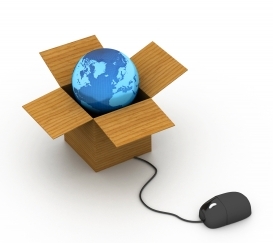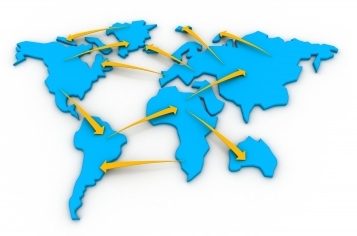- Home ›
- One Stop Europe ›
- Global Ecommerce
Global Ecommerce
How Global Ecommerce Changes the Postal Product & Service Portfolio

According to a study by EMOTA, ecommerce Europe, and IPC/BCG, global B2C ecommerce sales amounted to EUR 1062 billion in 2013.
2013 marked growth of 18% in North America, by 19% in Europe (25% in Eastern Europe) and 30% in Asia Pacific in 2013. Asia Pacific will soon overtake Europe (EUR 350 billion in 2013) as the largest ecommerce market.
In 2012, online goods worth EUR 40 billion were traded across European borders, and cross-border ecommerce in the EU is set to grow by 75% to 2020.
Returns and the traceability of goods and services are a priority for up to 50% of consumers.
With letter items in decline, postal operators are turning their attention to ecommerce as an alternative source of revenue.
Where the universal service obligation was previously linked to nationwide, daily mail distribution, with the delivery of documents at its core, the delivery of services and goods purchased by customers on ecommerce platforms is focused on the reliable and traceable delivery of merchandize.
The Universal Service Obligation is being redefined
Ecommerce-driven
business to consumer (B2C) delivery has the potential to fundamentally change
the service portfolio and service obligation of postal services:
- Daily delivery of mail items to individual mailboxes (last mile delivery) is under threat, with major national postal operators already delivering 2/3rd of all mail items to community mailboxes rather than to the doorstep in an effort to cut costs.
- Daily delivery service only applies to letter mail items that fall within the Universal Service Obligation (USO). However, a majority of mail items in Europe already fall outside the scope of the USO.
- In addition to the postal address, more and more alternative delivery addresses are being established. Soon last mile delivery to the doorstep will become the exception, and possibly only available at a premium.
This change in the mail mix also leads to fundamental changes in the product & service structure.
- The distinction between letter and parcel mail items is becoming obsolete, with more and more merchandize already being sent via the letter mail channel. Letter mail is neither designed nor priced to accommodate the delivery of merchandize.
It is therefore no surprise that ecommerce, in particular registered mail for cross-border, traceable items, neither fits in with current delivery processes, nor sufficiently covers the costs involved.
UPU Terminal Dues & Inward Land Rate systems need adapting
Postal services have understood that global ecommerce requires a new postal service offering.
The UPU is currently designing a traceable and quality-of-service measured, cost efficient, cross-border, 0–30 kg, delivery product.
The more posts become involved in global ecommerce, the more service-based pricing needs to be established, and the current Terminal Dues system with the Inward Land Rate System combined.
The necessary customs, digital forms and process integration will drive forward adaptions to UPU regulations and conventions.
National posts can compete with international parcel integrators
The benefits for the designated postal operators of working closely to establish a single, global, integrated ecommerce fulfillment network are manifold:

- A single, integrated delivery network gives posts the structure and tools to compete with large international parcel
integrators on the business-to-consumer (B2C) market.
- Posts become the partners of choice for local online retailers and SMEs wishing to expand their business outside domestic markets, offering barrier-free access to customers in 192 UPU member countries.
- Posts will be able to offer e-retailers a complete portfolio of products for cross-border ecommerce goods fulfilment, including full visibility, track & trace of purchased and returned goods, and set end-to-end transit times.
- The network is based on globally binding UPU standards, determining responsibility for the entire end-to-end process and with customs and service reliability commitments of up to 95%.
- Service-related information, in particular tracking information,will be available within a short, specified timeframe (e.g. 6 hours), to a reliability level of 99%, making it possible to support pro-active customer interaction.
In short, global ecommerce is forcing postal services to cooperate more closely, redefine their traditional products & services, and facilitate smooth and unimpeded global, B2C cross-border delivery.
However, due to its vastly greater volumes, B2C document-based communications will always represent much greater potential for postal services than delivery of B2C merchandise. It is here, by creating next generation postal communication logistics networks for consequential communications, that the potential for real revenue generation lies.
Walter Trezek is the Chairman of the Consultative Committee (CC) of the Universal Postal Union (UPU).
- Home ›
- One Stop Europe ›
- Global Ecommerce
Does this article cover a topic relevant to your business? Access the CLS Business Lounge for the market intelligence you need to stay ahead of the crowd. Find out more


